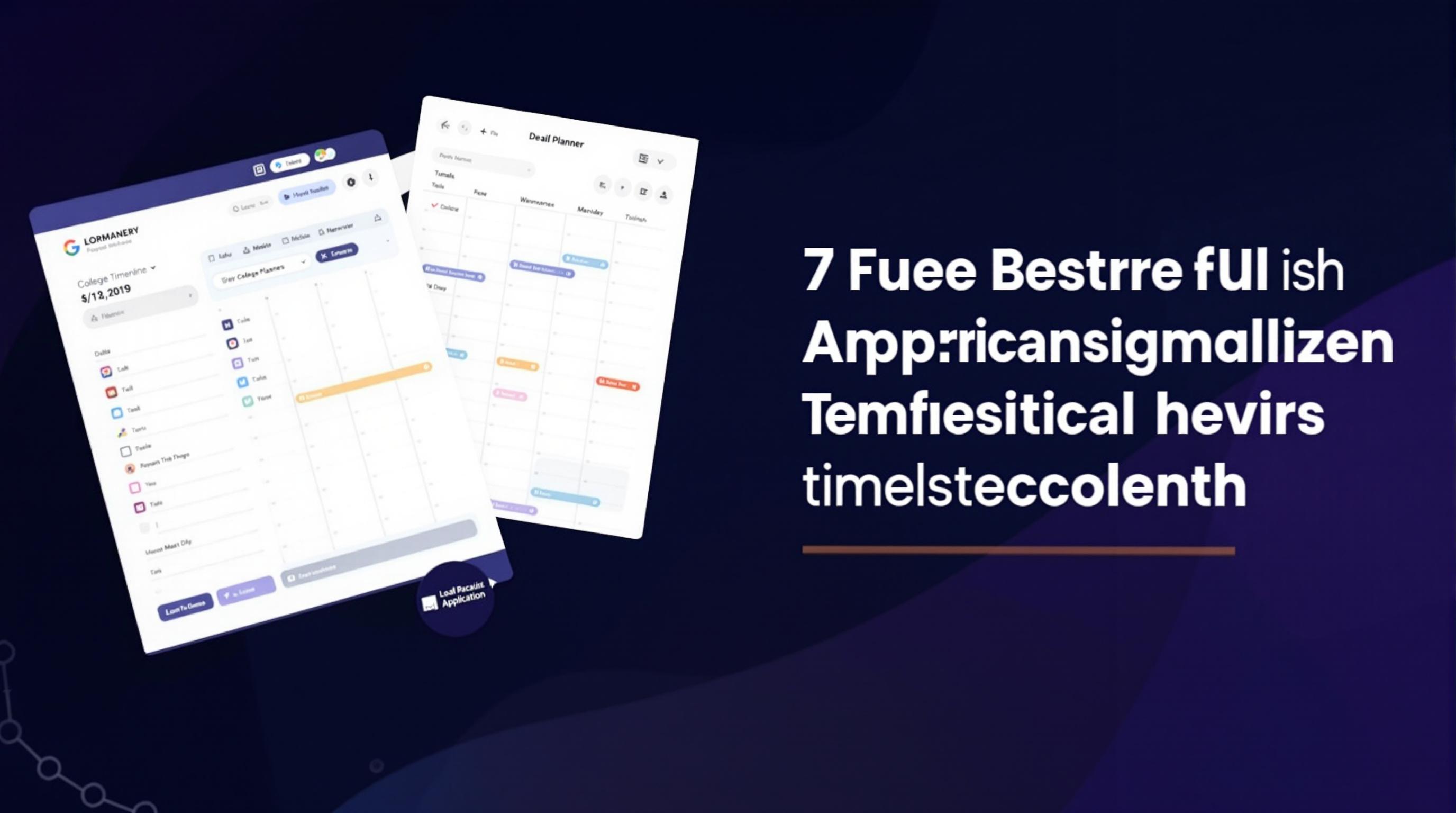Related Articles
- When Campus Cafeterias Shape Your Wallet More Than Tuition: The Overlooked Price of Student Food Choices
- How AI-Powered Avatars Are Changing Remote Campus Experiences Beyond Traditional Virtual Visits
- 7 Essential Digital Planners Released Since 2019 for Mastering Your College Application Timeline Like a Pro
- Unseen Impact of Accreditation Shifts on Small College Town Economies and Local Communities
- How Campus Eco-Initiatives Secretly Shift Student Choices Beyond Traditional Ranking Metrics
- 7 Emerging Smart Notebooks for Interns That Outperform Traditional Paper Planners
7 Essential Digital Planners Released Since 2019 for Mastering Your College Application Timeline Like a Pro
7 Essential Digital Planners Released Since 2019 for Mastering Your College Application Timeline Like a Pro
Mastering your college application timeline can be a daunting task, but using the right digital planner can transform chaos into clarity. Here, we explore seven essential digital planners released since 2019 that help you stay organized, motivated, and ahead of deadlines like a pro.
Stay Ahead with Todoist: The Productivity Powerhouse
Todoist, revamped significantly after 2019, is one of the most versatile digital planners available. Its clean interface and robust task management system make it perfect for breaking down those overwhelming application deadlines into bite-sized, manageable chunks.
Whether you’re tracking essay deadlines or scheduling campus visits, Todoist lets you create custom projects and priority levels. According to a 2021 study by the American Psychological Association, breaking big tasks into smaller ones can reduce anxiety by 30%. By setting reminders and recurring tasks, Todoist helps prevent last-minute panic—a lifesaver during application season.
A Student’s Journey: How Mia Used Trello to Ace Her Applications
Back in 2020, Mia, an 18-year-old high school senior from Seattle, was juggling extracurriculars, SAT prep, and college applications. She began using Trello after discovering its visually appealing kanban boards. Each "card" represented a task—draft essay, request letter of recommendation, submit FAFSA—and she could move it through stages: To Do, Doing, Done.
Mia’s story illustrates how Trello’s intuitive design lessens cognitive load, allowing students to see their progress in real-time. By the end of the season, Mia had submitted her applications ahead of time and was accepted to her dream university. This hands-on example underscores Trello’s effectiveness in managing complex workflows.
Some Humor to Keep You Sane: The “Planner Overload” Phenomenon
Let’s be honest; if you had one dollar for every planner app promising to “change your life,” you might have enough saved to cover college tuition by now! The irony is that over-planning can sometimes lead to procrastination. That’s where using the right digital planner tailored for your specific needs becomes crucial.
Think of digital planners as your personal sherpa guiding you up the mountain of deadlines. Some tools are like caffeine—boosts in short bursts—while others are steady companions. Finding your perfect match can turn the college application journey from a headache into a series of manageable, even enjoyable, steps.
Formal Precision: CollegePlanner Pro's Strategic Features
Designed with counselors and students in mind, CollegePlanner Pro boasts features like Gantt charts and calendar integrations that articulate a formal timeline suited to rigorous academic scheduling. Since its 2019 update, it incorporates Priority Matrix and even financial aid tracking, catering to comprehensive preparation.
Its data-driven insights, such as probability estimates based on early submissions and student profiles, help users make informed decisions. According to internal user data, 72% of students using CollegePlanner Pro reported reduced deadline misses.
Why Not Keep It Casual? Using GoodNotes for Freeform Planning
GoodNotes offers a different flavor by focusing on handwriting and flexibility, ideal for the creatively inclined. Released updates after 2019 have enhanced Apple Pencil integration, making it feel like an analog planner but with all the perks of digital—searchable notes and easy reorganizing.
For students who prefer sketching out ideas for essays or mind-mapping the colleges they want to apply to, GoodNotes’s freeform style supports various methods of organization, from traditional to graphic-heavy.
Persuading Productivity with My Study Life
My Study Life, popular among students globally, combines timetable management with task tracking, a perfect companion for those balancing schoolwork alongside college applications. The 2020 update introduced cross-device syncing, meaning you can plan on your phone and check your agenda on your laptop seamlessly.
With over 1 million downloads, My Study Life’s data shows 65% of its users complete tasks faster when they use notification features diligently. It’s a reminder that consistency trumps intensity—the best digital planner is the one you actually use.
Statistically Speaking: The Importance of Structured Planning
According to a 2022 survey by the National Association for College Admission Counseling, nearly 68% of students who used any form of organizer or digital planner reported feeling less overwhelmed. Moreover, those students were 40% more likely to submit their applications before early deadlines, gaining an advantage in rolling admissions cycles.
This reflects a broader trend toward digital planning tools becoming indispensable in academic success, especially in complex, multi-step processes like college admissions.
Not Just for Students: Elderly Learners and Digital Organization
At age 65, Linda decided to apply to university to pursue her long-held passion for history. She found digital planners challenging at first but discovered Notion. Released globally post-2019, Notion’s customizable templates allowed her to create an application tracker, store research on universities, and note deadlines—all in one place.
Linda shows us that digital planners are not just for the tech-savvy youth; their adaptability makes them accessible to all ages and backgrounds, facilitating lifelong learning and personal growth.
The Versatility of Notion: A Storyteller’s Toolkit
If you crave customization, Notion released critical updates after 2019 that make it a hybrid tool capable of everything from spreadsheets to daily journals. Its database-style structure caters to different workflows.
Imagine being able to attach application essays alongside a calendar and reminders, all cross-linked for quick access. Notion operates like a digital Swiss Army knife, perfect for those who want control over every detail of their college application process.
Choosing the right digital planner is crucial for managing a complex college application timeline effectively. Whether you prefer the formal rigor of CollegePlanner Pro or the creative freedom of GoodNotes, the major takeaway is to engage early, stay consistent, and leverage technology that fits your style. Start planning now, and watch your college dreams become attainable realities.

